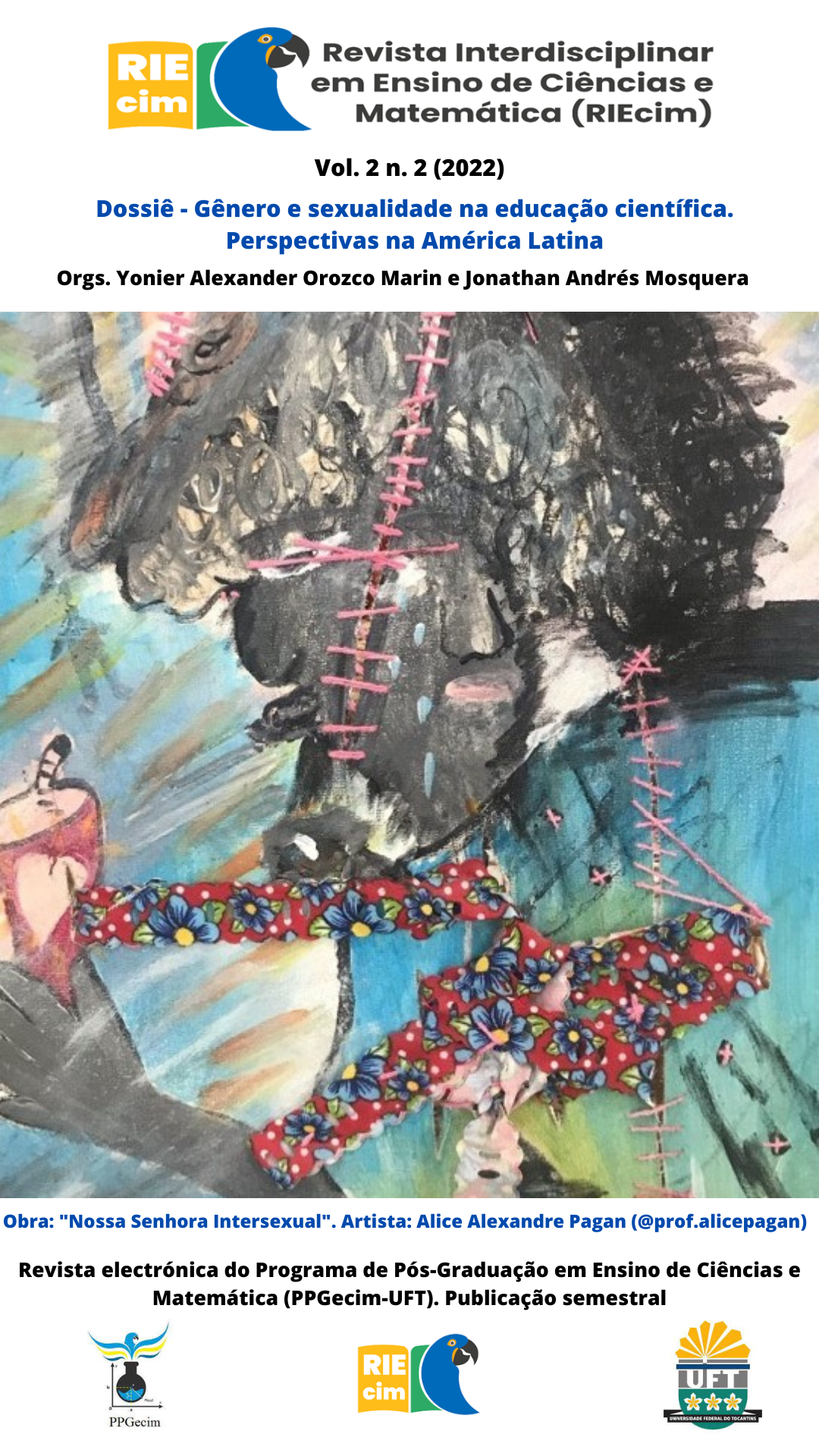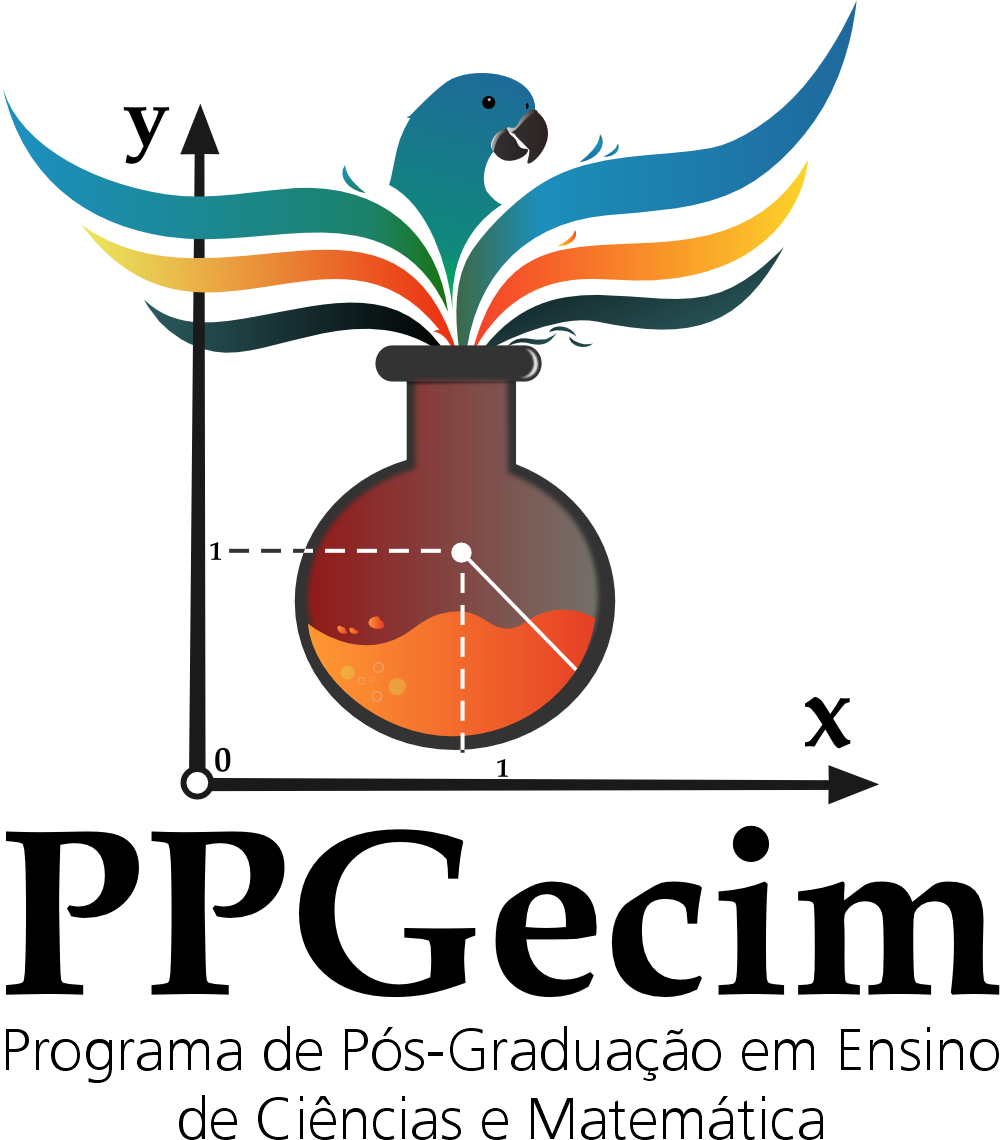VIAJAR-MUNDOS HACIA EL SUJETO DE LA CIENCIA Y DE LA FORMACIÓN DE PROFESORES DE CIENCIAS: UNA PROPUESTA DE PRAXIS EDUCATIVA DESDE EL FEMINISMO DECOLONIAL
A PROPOSAL OF EDUCATIONAL PRAXIS FROM DECOLONIAL FEMINISM.
DOI:
https://doi.org/10.20873/riecim.v2i2.14860Keywords:
Viajar-mundos, Praxis educativa, Feminismo decolonial, Epistemología feminista en la ciencia, Formación de profesores de CienciasAbstract
The purpose of this article is to raise some reflections on the subject for science and its implications in science education, as well as to propose a view of educational praxis from the concept of traveling-worlds of María Lugones. From a documentary review, some criticisms to the hegemonic subject of science and to an androcentric science are collected from feminist epistemologies. The relationship between knowledge, gender and science is also reviewed from decolonial feminism and studies on decoloniality of knowledge. From a decolonial perspective it is possible to understand the inseparability of categories such as race, class, gender and geopolitical location, among others, for the analysis of the modern/colonial system of knowledge. In this sense, the vertical relationship of the university with the school and its consequent approach of theory over practice, as well as the hierarchical division of knowledge in the educational system, are understood as ways of reproducing the various oppressions and exclusions of the modern/colonial gender system. Finally, it is proposed that the struggle of teachers to be recognized as epistemic subjects is also for epistemic and social justice, therefore, conceiving teachers as travelers of worlds could contribute to a praxis for social transformation in Latin America. This requires establishing coalitions and collaborations in science education through networks and creation of worlds to be with others.
References
ANTILEO BAEZA, E. (2015). Trabajo racializado. Una reflexión a partir de datos de población indígena y testimonios de la migración y residencia mapuche en Santiago de Chile. Meridional. Revista Chilena De Estudios Latinoamericanos, (4), Pág. 71–96. Recuperado a partir de https://ultimadecada.uchile.cl/index.php/MRD/article/view/36531
AYMORÉ, Débora; KOIDE, Kelly; TOLEDO FERREIRA, Mariana. Ativismo, feminismo e filosofia da ciência. Scientiae Studia. Revista Latino-Americana de Filosofia e História da Ciência. São Paulo, vol 15, no. 1, 145-162, 2017.
BIDASECA, Karina; GUIMARÃES COSTA, Michelly Aragão. Viajar-mundos hacia María Lugones. Revista Estudos Feministas, vol. 30, no. 1, p. 1–12, 2022. https://doi.org/10.1590/1806-9584-2022v30n185054.
CAMACHO-GONZÁLEZ, Johanna Patricia. Educación Científica, reflexiones y propuestas desde los feminismos. Revista Científica, vol. 38, no. 2, p. 190–200, 2020. https://doi.org/10.14483/23448350.15824.
CASTAÑEDA SALGADO, Martha Patricia. Mujeres católicas rurales, ritualidad e identidad. 2008.
CICCIA, Lucía. La dicotomía de los sexos puesta en jaque desde una perspectiva cerebral. Descentrada. Revista interdisciplinaria de feminismos y género, [S. l.], v. 2, n. 2, p. e052, 2018. Disponível em: https://www.descentrada.fahce.unlp.edu.ar/article/view/DESe052. Acesso em: 29 ago. 2022.
ESPINOSA-MIÑOSO, Yuderkys. Una crítica descolonial a la epistemología feminista crítica. El Cotidiano, vol. 184, p. 7–12, 2014.
FIORUCCI, Flavia; NAVARRO, Camila Pérez; BATISTA, Pía; ESPINOZA, G. Antonio; GOETSCHEL, Ana Maria. Trayectorias de feminización del magisterio en Sudamérica. Los casos de Argentina, Chile , Ecuador , Perú y Uruguay. Revista de História de América, vol. 163, no. 0034–8325, p. 85–133, 2022.
FREIRE, Paulo. Pedagogia da autonomia. Saberes necessários à prática educativa. 1. ed. Rio de Janeiro: Paz & Tierra, 2021.
HARAWAY, Donna. Manifesto cirborgue: ciência, tecnologia e feminismo-socialista no final do século XX. In: BUARQUE, Heloisa de Hollanda. Org. Pensamento feminista: conceitos fundamentais. Rio de Janeiro: Bazar do Tempo, 2019.157-210.
HARDING, Sandra. ¿Una filosofía de la ciencia socialmente relevante? Argumentos en torno a la controversia sobre el punto de vista feminista. In: BLAZQUEZ, et al., Org. Investigación feminista: epistemología, metodología y representaciones sociales. México: UNAM, Centro de Investigaciones Interdisciplinarias en Ciencias y Humanidades: Centro Regional de Investigaciones Multidisciplinarias: Facultad de Psicología, p. 39-65, 2012.
KOROL, Claudia. Feminismos territoriales. Hacia una pedagogía feminista /1. [S. l.: s. n.], 2019.
LUGONES, María. Multiculturalismo radical y feminismos de mujeres de color. Revista internacional de filosofía política, no. 25, p. 61–76, 2005.
LUGONES, Maria Cristina. Playfulness, “World”-Travelling, and Loving Perception. vol. 2, no. 2, p. 3–19, 1987.
LUGONES, Maria. Colonialidad y género. Tabula Rasa, no. 9, p. 73–101, 2008.
LUGONES, María. Hacia metodologías de la decolonialidad. Prácticas otras de conocimiento (s): Entre crisis y guerras, vol. 3, 2015.
MAFFÍA, Diana. Epistemología feminista: La subversión semiótica de las mujeres en la ciencia. Revista Venezolana de Estudios de la Mujer, Vol 12, No.28, p. 63-98, 2007.
MAFFÍA, Diana. Género y políticas públicas en ciencia y tecnología. In: BLAZQUEZ, et al., Org. Investigación feminista: epistemología, metodología y representaciones sociales. México: UNAM, Centro de Investigaciones Interdisciplinarias en Ciencias y Humanidades: Centro Regional de Investigaciones Multidisciplinarias: Facultad de Psicología, p. 139-195, 2012.
MENDOZA, Breny. La cuestión de la colonialidad de género. Ensayos de crítica feminista en Nuestra América. México: Editorial Herder, P. 45-71, 2014.
MIGNOLO, Walter. El pensamiento des-colonial, desprendimiento y apertura: un manifiesto. Revista Telar ISSN 1668-3633, no 6, p. 7-38, 2008.
OROZCO MARÍN, Yonier Alexander; CASSIANI, Suzani. Enseñanza de la Biología y lucha antirracista: Posibilidades al abordar la alimentación y nutrición humana. Revista de educación en biología, 2021, vol. 24, no 1, p. 39-54
OROZCO MARÍN, Yonier Alexander. Caminos didácticos para la enseñanza de la biología y la lucha antirracista: una deuda histórica y una necesidad urgente. Voces y silencios. Revista Latinoamericana de Educación, vol. 12, no 1, p. 200-228, 2021.
QUIJANO, Aníbal. La crisis del horizonte de sentido colonial/moderno/eurocentrado. Casa de las Américas, vol. 50, no 259-260, p. 4-15, 2010.
QUIJANO, Aníbal. Colonialidad del poder y clasificación social. Contextualizaciones latinoamericanas, vol. 2, no 5, 2015.
QUIJANO, Aníbal. Colonialidad del poder, eurocentrismo y América Latina. Espacio Abierto, vol. 28, no 1, p. 255-301, 2019.
REZENDE, Flavia; OSTERMANN, Fernanda; GUERRA, Andreia; SIRY, Christina. South epistemologies to invent post-pandemic science education. vol. 16, p. 981–993, 2021. DOI 10.1007/s11422-021-10091-3. Available at: https://doi.org/10.1007/s11422-021-10091-3.
SANTOS, Boaventura de Souza; AGUILÓ, Antoni. Aprendizajes globales: descolonizar, desmercantilizar y despatriarcalizar desde las epistemologías del sur. 1. ed. Barcelona: Icaria editorial, 2019.
SEOANE, Viviana I. Los feminismos y la currícula universitaria: su impacto en la dimensión político-pedagógica y epistémica. In: CRUZ, V; LÓPEZ, MN; LUQUET, C (eds.). Transversalizar la perspectiva de género. [S. l.: s. n.], 2020. p. 38–49.
ESPINOSA-MIÑOSO, Yuderkys. Una crítica descolonial a la epistemología feminista crítica. El Cotidiano, vol. 184, p. 7–12, 2014. .
UNESCO. OREALC. Antecedentes y criterios para la Elaboración de Políticas Docentes en América Latina y el Caribe. Santiago de Chile: OREALC/UNESCO, 2013. Disponível em: http://unesdoc.unesco.org/ images/0022/002232/223249S.pdf. Acesso em: 5 ago. 2022.
Downloads
Published
Versions
- 2023-01-04 (2)
- 2022-12-30 (1)
How to Cite
Issue
Section
License
Copyright (c) 2022 Lisbeth Lorena Alvarado Guzmán, Mara Karidy Polanco Zuleta

This work is licensed under a Creative Commons Attribution-NonCommercial 4.0 International License.
Copyright Policy
Copyrights are retained by the authors, who grant RIEcim the exclusive rights for first publication. Authors will not be remunerated for the publication of their work in this journal. Authors are permitted to enter into separate, additional contractual arrangements for the non-exclusive distribution of the work's published version in this journal (e.g., post it to an institutional repository, on a personal website, publish a translation, or as a book chapter), with acknowledgement of authorship and initial publication in this journal. The Journal's editors have the right to make textual adjustments and adaptations to conform to publication standards.
Open Access Policy
This journal provides immediate open access to its content, following the principle that freely providing scientific knowledge to the public contributes to the global democratization of knowledge. Users can read, download, copy, distribute, print, search, or use the content for any legal purpose, respecting national copyright laws and without seeking prior permission from the publisher or the author. The opinions presented in the articles are the responsibility of the authors. The Journal does not charge Article Processing Charges (APCs).
Licensing Policy - Usage License
Licensed under the Creative Commons Attribution-NonCommercial 4.0 International (CC BY-NC 4.0) License. This license allows sharing, copying, redistributing the manuscripts published in RIEcim in any medium or format. Additionally, it allows adapting, remixing, transforming, and building upon the material, as long as proper credit is given to the author and initial publication in this journal is acknowledged.

































